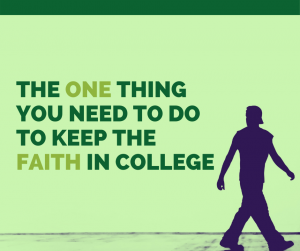The bike ride has become legendary among my wife and children, the kind of story that seems to increase in dramatic effect with each re-telling.
Just a day or two into my freshman year at James Madison University, I mounted my bike and navigated to what was then the outer reaches of campus to make my way to the corner of South Main and what is now MLK Jr. Way.
There, inside the Baptist Student Center, a group of students was getting ready to welcome new students at the start of the school year. The woman who several years later would become my wife was among them.
 She laughs now, remembering how the group of upperclassman was puzzled by a freshman making his way, on his bike, to find out more about their small campus ministry. Apparently, no one had ever arrived days before their first event to introduce himself.
She laughs now, remembering how the group of upperclassman was puzzled by a freshman making his way, on his bike, to find out more about their small campus ministry. Apparently, no one had ever arrived days before their first event to introduce himself.
But visiting the campus group was on top of my list of things to do before classes started, because having grown up in the church, I was determined to find friends who shared my faith.
Turns out it was one of the best decisions I made early in my time as a JMU student. The relationships I developed there deepened me and made my faith more real than it had been in the past.
Getting Connected
Getting connected to a Christian community turns out to be the best way to maintain your faith in college. Conversely, not being connected to community could be the best way to weaken your faith.
Freshmen “leave their church, the community incentives to attend it, and the watchful eye of parents who get angry or make them feel guilty when they don’t go to services or stray in their faith,” Conor Friedersdorf wrote in The Atlantic. “Suddenly they’re surrounded by dorm mates of different faiths or no faith at all.”
I certainly was, and I can only imagine the different person I would have become had I immersed myself in a different community.
Unfortunately, two-thirds of Americans who attended a Protestant church regularly for at least a year as a teenager say they also dropped out for at least a year between the ages of 18 and 22, according to Lifeway Research.
And so, in an environment where more students than ever have no faith at all and where ideas opposed to Christianity are increasingly part of campus culture, being connected to other Christians is vital for faith to flourish during college.
Join a Local Church
Being part of a Christian community also means being part of a local church. I checked out several during my college days. The ones that made the most difference were strong in biblical teaching and intergenerational community. While hanging out with my college friends in our campus ministry was valuable, it was also good to know and be known by people in other stages of life, people like the married couple who invited students over for lunch or the elderly saints whose many years of faith showed me how faith could persevere for decades.
That group of students I connected with in campus ministry also got connected to local churches. Some went to either of the two larger Baptist churches. Some went to a non-denom that met with a lake as a backdrop. A few went to a Presbyterian gathering that met in a school gym.
Most Sundays, we’d gather after our various worship services for brunch at the dining hall on campus. Those Sunday mornings, with worship and then a meal afterwards, make up some of my best memories. We were all learning and growing in different ways, and it was good to talk through those things in our dorm rooms, or even during brunch. In fact, when they tore down the dining hall and sold bricks as keepsakes, I bought one. It now sits on my screened porch, where it reminds me of how good it is to live in community, and how glad I was to have a solid Christian community in college.
First Pres takes intergenerational community seriously, and we’d love to have you join us during your college years. To find out more, check out our college page online.
